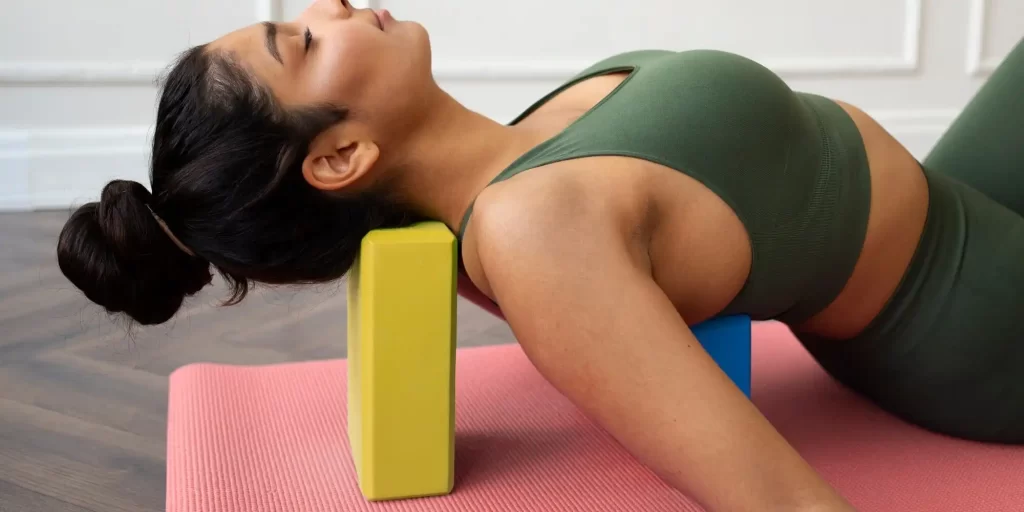Yoga blocks are versatile props that can significantly enhance your yoga practice by providing stability, support, and alignment. With a variety of materials, sizes, and shapes available in the market, choosing the right yoga block may seem like a daunting task. Fear not, as this guide will help you navigate the options and find the perfect yoga block tailored to your practice and personal preferences.
Understanding the Basics
Materials
Yoga blocks are commonly made from foam, cork, or wood. Each material has its unique characteristics, catering to different needs.
- Foam Blocks:
- Pros: Lightweight, affordable, and comfortable.
- Cons: May compress over time, less durable than cork or wood.
- Cork Blocks:
- Pros: Durable, eco-friendly, and provides excellent support.
- Cons: Heavier than foam, may be more expensive.
- Wooden Blocks:
- Pros: Sturdy, durable, and aesthetically pleasing.
- Cons: Heavier than foam, less comfortable for seated poses.
Consider your priorities – whether it\’s eco-friendliness, durability, or comfort – and choose a material that aligns with your values and needs.
Sizes and Shapes
- Standard Size:
- Dimensions: 4 x 6 x 9 inches.
- Ideal for: Most practitioners, providing a good balance of support and versatility.
- Large Size:
- Dimensions: 4 x 6 x 12 inches.
- Ideal for: Taller individuals or those who need extra height and support.
- Smaller Size:
- Dimensions: 3 x 6 x 9 inches.
- Ideal for: Smaller individuals or those with less hand strength.
- Unusual Shapes:
- Options: Beveled edges, curved surfaces.
- Ideal for: Specific alignment needs or adding variety to your practice.
Matching Your Yoga Block to Your Practice
Restorative Yoga:
For gentle and supported poses in restorative yoga, opt for softer foam blocks. Their comfortable surface is perfect for extended periods of relaxation.
Hatha and Iyengar Yoga:
Cork or wood blocks are excellent choices for these practices, providing a solid and stable foundation for various poses. The durability of these materials ensures they withstand frequent use.
Power and Vinyasa Yoga:
Foam blocks are the go-to choice for dynamic practices, as they are lightweight and easy to maneuver. Consider a larger size if you need extra height and stability.
Personal Preferences Matter
Apart from the technical aspects, your personal preferences play a crucial role in choosing the right yoga block. Consider the following:
- Texture: Some prefer the smooth surface of foam, while others appreciate the natural feel of cork or wood.
- Weight: If you prioritize portability, foam blocks are the lightest. However, if you value stability over weight, cork or wood may be more suitable.
- Aesthetics: Let your yoga block reflect your style. Whether it\’s the warmth of wood, the earthiness of cork, or the vibrant colors of foam, choose a block that resonates with you.
In conclusion, selecting the right yoga block involves a balance between material, size, and personal preference. Consider the demands of your yoga practice, your body\’s needs, and what brings you comfort and joy. Whether you opt for the lightweight convenience of foam, the eco-friendly nature of cork, or the timeless appeal of wood, your yoga block should be an extension of your practice, supporting you on your journey to wellness and self-discovery.
Frequently Asked Questions (FAQs)
Q1: Why do I need a yoga block?
A1: Yoga blocks provide stability, support, and alignment in various poses, enhancing your practice by making it more accessible and comfortable.
Q2: What material is best for a yoga block?
A2: The best material depends on your priorities. Foam blocks are lightweight, cork is durable and eco-friendly, while wood offers sturdiness and aesthetics.
Q3: How do I choose the right size?
A3: Consider your height, hand strength, and the type of yoga you practice. Standard sizes are versatile, large blocks provide extra height, and smaller ones suit petite individuals.
Q4: Can I use a yoga block for meditation?
A4: Absolutely! A softer foam block can provide a comfortable seat, supporting your posture during meditation and promoting relaxation.
Q5: Are there specific blocks for different yoga styles?
A5: Yes, the choice of material and size can be tailored to your preferred yoga style. Foam blocks are great for dynamic practices, while cork and wood are ideal for more static styles like Hatha and Iyengar.
